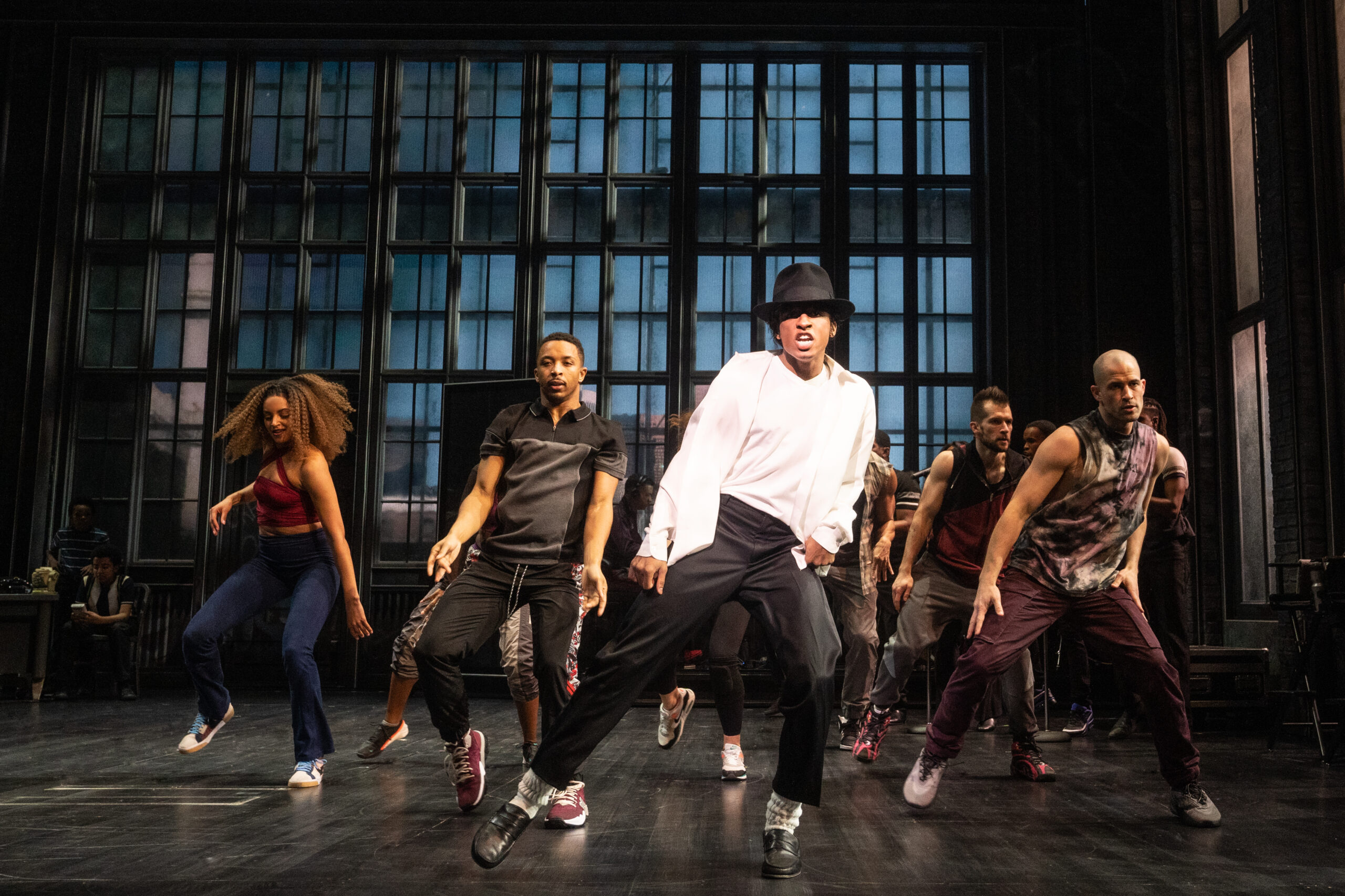SALT LAKE CITY — At the height of his fame Michael Jackson was dubbed the King of Pop. As a singer, songwriter, choreographer, dancer, and artist it seemed he had the Midas touch on each album. There was nothing he couldn’t do. As such, it isn’t surprising that only a decade after his tragically early death in 2009 a jukebox musical was devised to pay tribute to his legacy. Despite a rocky opening due to the pandemic, the Broadway musical has been performed to sold out houses nationwide. It has been a box office hit and won four Tony Awards alongside a slew of other notable accolades. Despite these success measures of the show, critics have given the show mixed reviews. The King of Pop’s story is polarizing, which is why I would consider the show a tribute with a very sympathetic angle rather than any kind of biographic work. The show gives feeling and context to his story and celebrates the man behind the moonwalk, making for a phenomenal night at the theatre. On Tuesday February 27, 2024 I had the opportunity to see MJ: The Musical with book by Lynn Nottage on the stage at Delta Hall as part of Broadway at The Eccles.
The play’s narrative opens in a studio where Michael Jackson and his crew are in the final rehearsals for his Dangerous World Tour which began in June of 1992. The dancers slowly enter and warm up as they wait for Michael to join them for the opening number “Beat It,” which sets the tone for the night as being a jaw dropping celebration of an unparalleled artist. After the number Michael is cajoled into giving a rare and reluctant interview to MTV reporter Rachel (Mary Kate Moore). She wants more than a fluff piece as she prods him with questions about his life as a performer and his childhood growing up in the limelight of an often-hostile press. The singer’s restless mind keeps percolating and adding new ideas, even in these last hours of finalizing the show. While some of the dialogue is heavy-handed, it is a well-communicated story that newcomers will easily be able to follow.
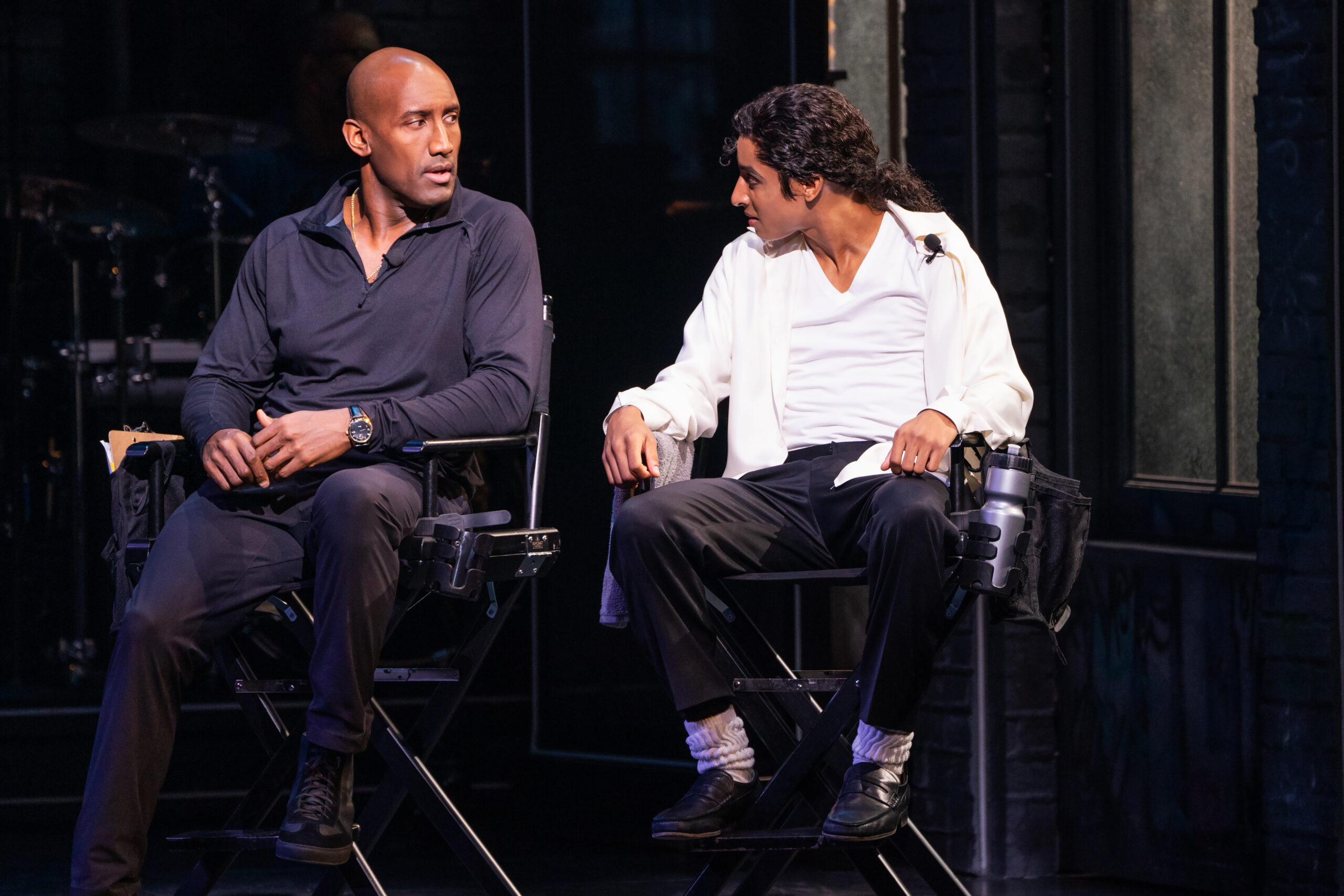
Lynn Nottage’s book weaves together Jackson’s music and goes much deeper than many jukebox musicals would in giving the show substance. The song selections chosen from MJ’s vast discography are a triumph. From the early days in the Jackson 5 to his solo billboard toppers, the musical numbers create a catchy roller-coaster of pop music history and evolution that spans generations. The production uses nonlinear storytelling with flashbacks to Michael’s formative years and early career. By thoughtfully placing the action in 1992, some of Jackson’s best works can be used, and it predates the most unsavory aspects that complicate his legacy.
Roman Banks is the 1992 MJ and gives an exceptional portray of Michael Jackson. His vocals are astounding and do justice to the original tracks. Likewise, he has mastered the signature dance stylings like the MJ shuffle, circle slide, crotch grab, toe stands, and, of course, the moonwalk. Banks captures MJ’s performance style, but also embodies his speaking voice and mannerisms in a way that feels authentic. Banks shows Michael’s sense of humor when he tells his managers that he must achieve his vision of popping onto the stage like a Japanese Animation character before God gives the idea to Prince, which made everyone laugh. Banks also makes it clear when MJ uses humor to deflect from the pain he feels inside, like randomly pulling out a water gun on his accountant to keep from having serious money talks. Banks’ MJ is mercurial and childlike in a way that doesn’t feel like just an impression of MJ, but really inhabits the part and is a marvel to behold throughout the whole show.
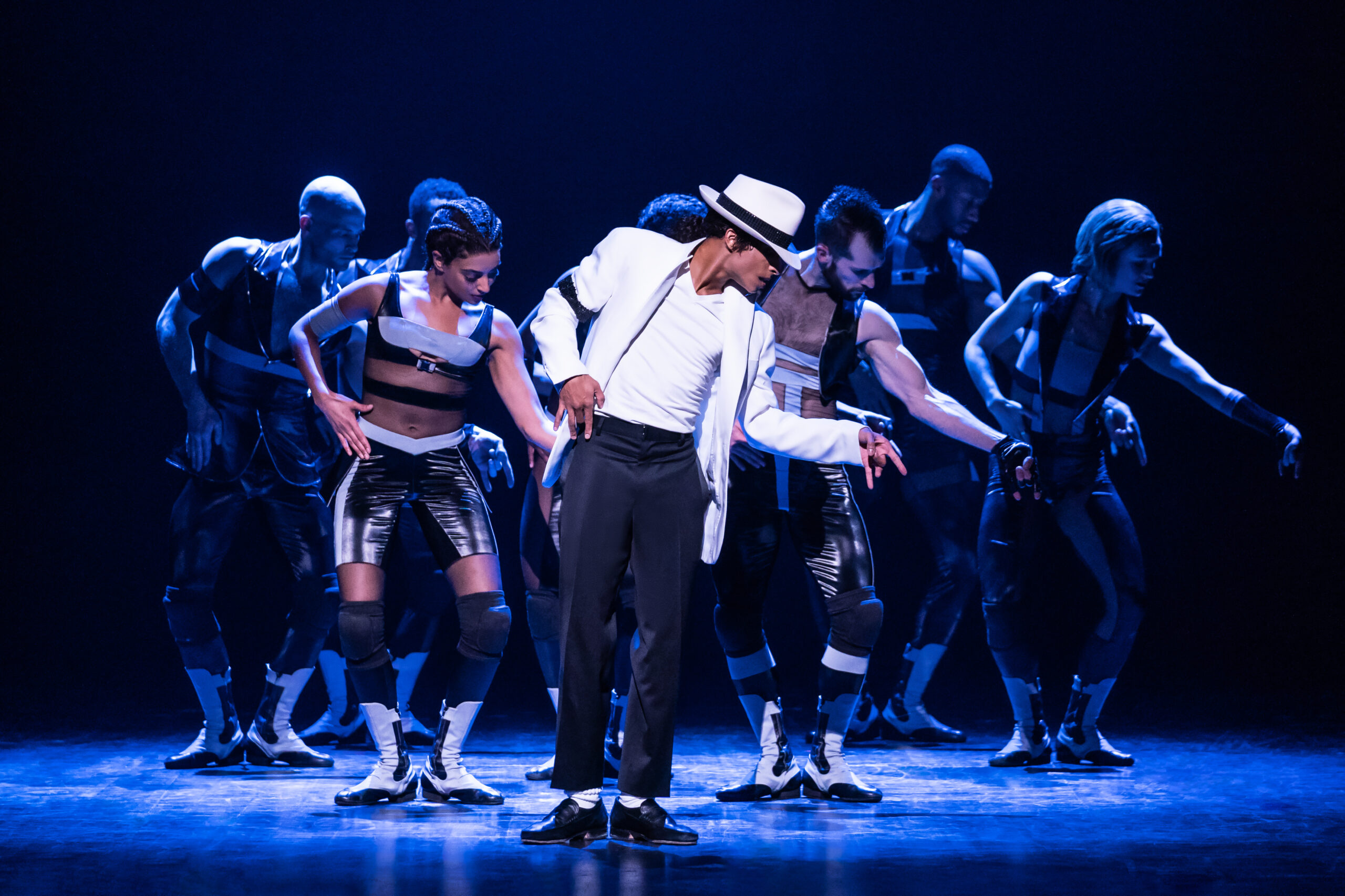
Helping to tell Michael’s story are younger versions of the singer. Little Michael, played by Josiah Benson, portrays his youngest performances with the Jackson 5 and a teenage Michael is played by Brandon Lee Harris. Both actors sing beautifully and have mastered MJ’s signature dance moves like the robot dance which Harris nails as the Jackson’s performed on Soul Train. Benson’s Little Michael shows a vulnerability of someone so small being thrust into such a demanding existence as he is lorded over by his abusive father.
Many actors played multiple parts. The most masterfully written and executed ensemble performance was given by Devin Bowles who plays Michael’s father Joseph Jackson as well as Rob, MJ’s manager for the Dangerous Tour. Bowles performance was so nuanced as he portrayed Rob as full of warmth and concern, saying that MJ was battling demons that he didn’t understand, then transitioning into Joseph who was gruff and demanding. Bowles was an astoundingly different person as MJ’s father. Joseph makes fun of his son’s looks and painfully taught him about racial issues he would have to deal with in his life as a black artist. His unrelenting demand for perfection made MJ internalize this pain and evolve into a perfectionist who was uncompromising with others. The father/son relationship is complicated and dynamic from both performers.
The live orchestra, directed by Victor Simonson, are well balanced and give an energy to the performance. I particularly loved orchestra in the scene which shows the artists that influenced MJ’s style. It feels like an old black and white Film Noir movie with a smooth jazz arrangement of “The Way You Make Me Feel” featuring a trumpet with a harmon mute before transitioning into “Smooth Criminal” and it’s 1930s gangster style.
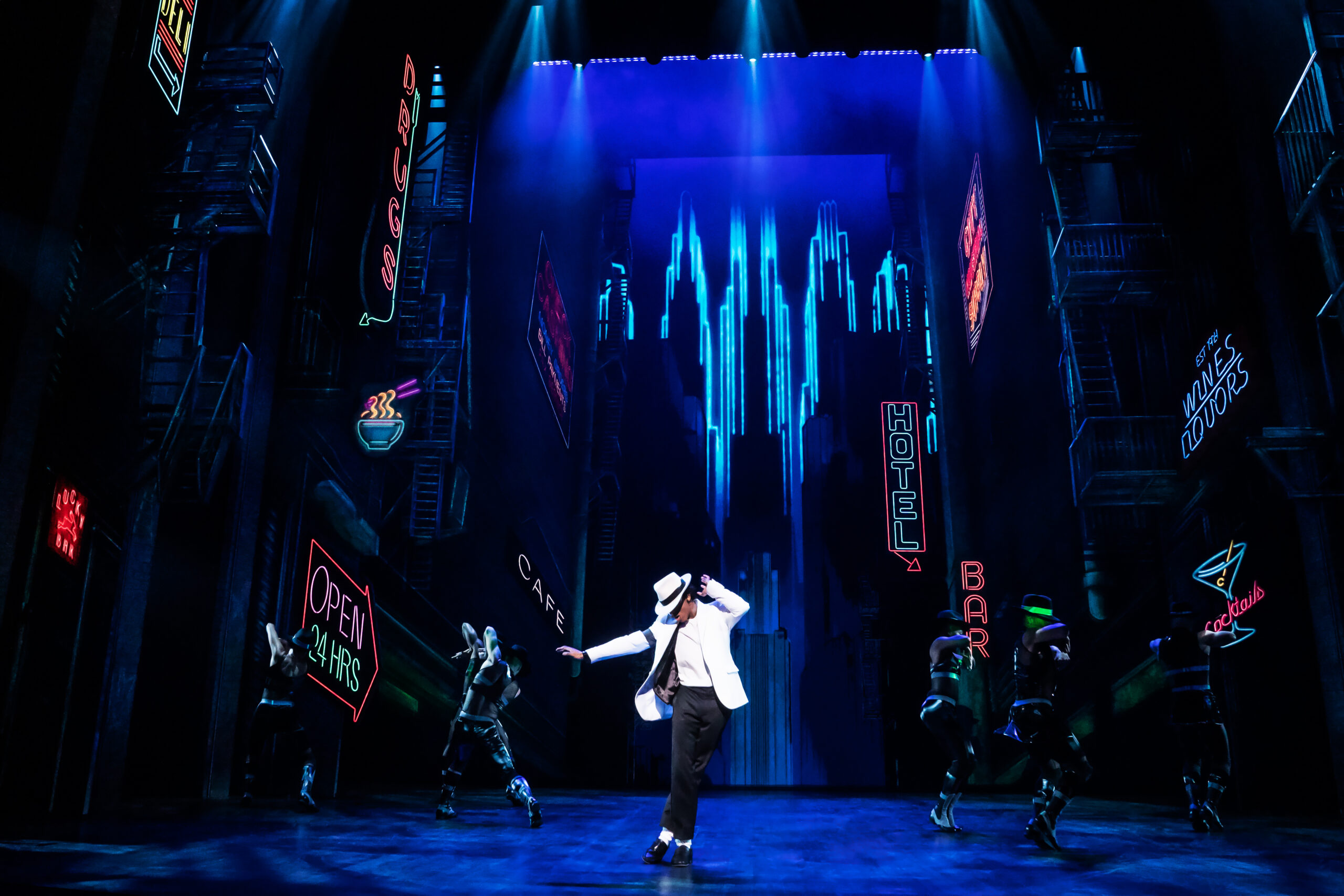
All the technical design of the show is of the highest theatrical standards. Scenic designer Derek McLane delivers a visual marvel with a seamless fusion of props, wagon pieces, practical set pieces, and modern technology. With projections designed by Peter Nigrini, the scenes evolve effortlessly from one into the next. One standout moment at the end of act one has MJ at a press conference with the projections on the back wall and scrims forming what looks like broken pieces of glass with newspaper headlines projected on them surrounding MJ and the dancers. This shattered set was a visually stunning backdrop for MJ’s performance of “They Don’t Care About Us.”
The costumes designed by Paul Tazewell capture all of MJ’s most recognized fashions. From his rhinestone glove to his red Thriller coat, each piece of Michael’s clothing is spot on. I was amazed at the volume of pieces every actor had in order to quickly change characters, show the progress of time, depict specific music videos, and give visual commentary to the action. In the shattered glass press conference, the dancer’s black coats were lined with tabloid fabric to show them barely concealing their desire to grab a quick headline at MJ’s expense.
Jackson’s life resembled a circus, and in some ways, so does the show. The ringleader of the night is director and choreographer Christopher Wheeldon who orchestrates magic on the stage by bringing all the technical, vocal, and physical elements of the show into a flow that is smoother than MJ’s circle slide. I have never been so amazed at a director’s ability to direct focus to the exact moment of performance like a magician. Using lighting designed by Natasha Katz, Michael brought a suitcase on stage and removed the glove and hat from it, to much applause, and started into “Billy Jean.” In a flash of lights and stagecraft, the scene moved on and I have no idea where the suitcase went.
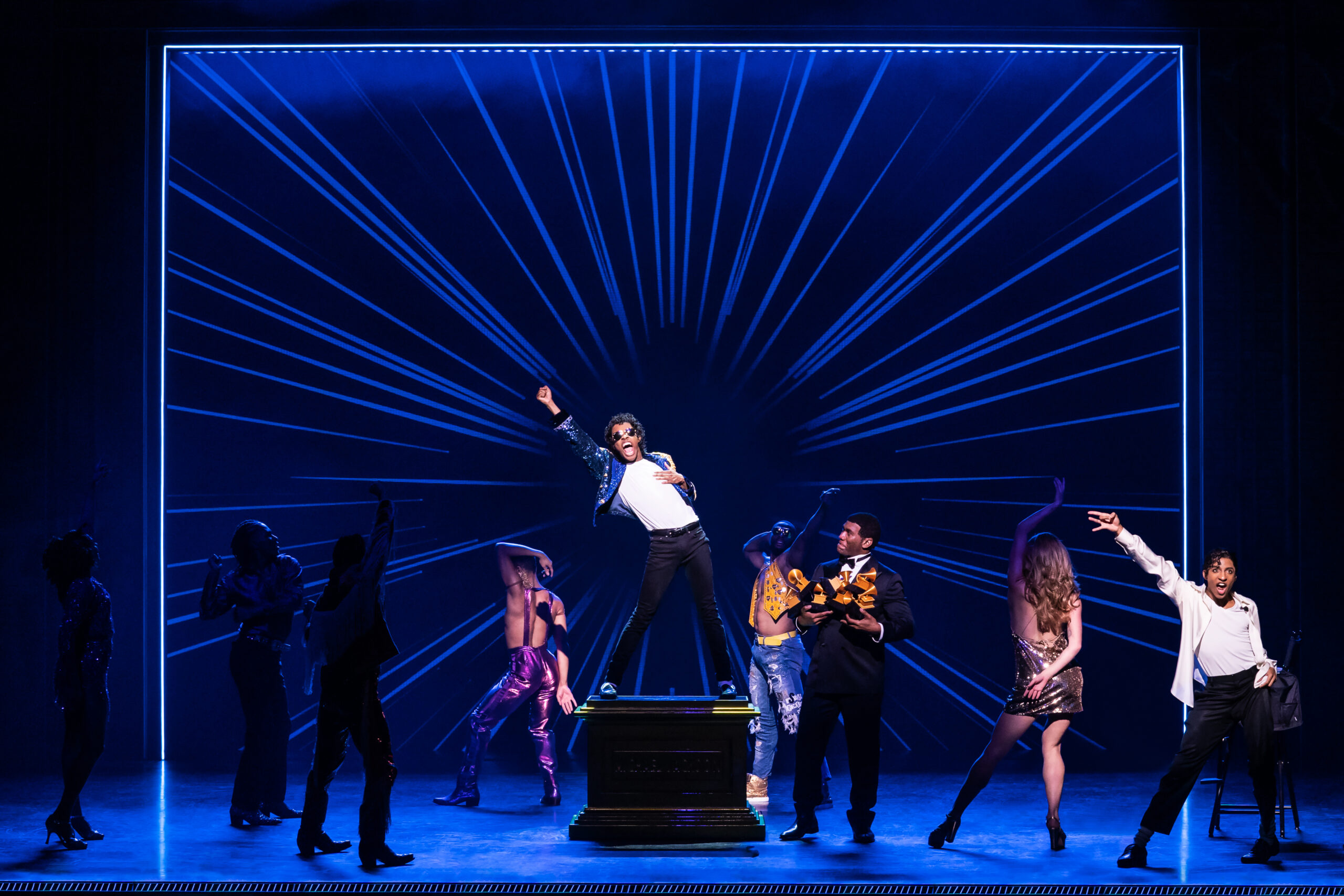
One of the main tensions of the plot has MJ demanding a toaster lift to start off the tour, and almost all MJ fans are well aware that he did have one and blew audiences away on the tour with it. Even though we know it happened in real life, so it will likely happen during the performance, Wheeldon’s direction of lights and focus makes each moment full of suspense and magic. The ending, in particular, is powerful and touching, as “Thriller” combines the music video moves and images we know with the story of the show by transforming Joseph into a monstrous puppeteer.
It is hard to boil a life as complicated as Michael Jackson’s down to two and a half hours, but the story presented is focused, touching, and relatable. It shows Michael’s past, full of physical and emotional abuse and isolation, which humanizes the singer as he battles drug addiction and the ghosts of his past that fuel his perfectionism. The spellbinding music and magnetic performances will please diehard fans and engage those less familiar with MJ’s body of work by offering a story that will moonwalk its way into the hearts of all who are fortunate enough to see it.
[box] The national tour of MJ: The Musical plays February 27th-March 3rd, 2024 at the George S. and Delores Dore Eccles Theatre (131 Main Street, Salt Lake City). Tickets range from $99-249. For more information visit https://saltlakecity.broadway.com/ [/box]

